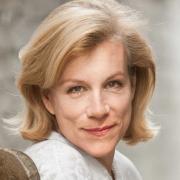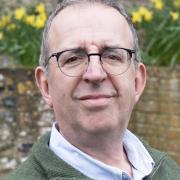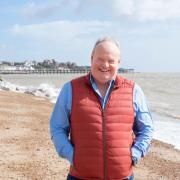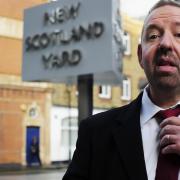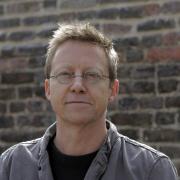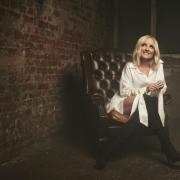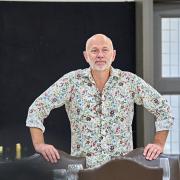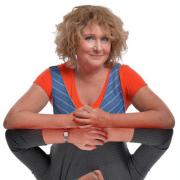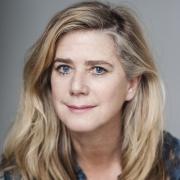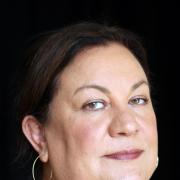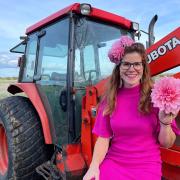There is no love lost between Bury MP David Ruffley and the current Tory leadership, as he freely admits. But he has high hopes for the future, and says he is now fighting fit, having made a full recovery after the train accident he suffered in 2010. Pat Parker spoke to him

David Ruffley welcomes me into his constituency office in Bury St Edmunds, and shows the mementoes of his political career which adorn the walls.
He’s particularly proud of a photo in which he and his then fellow whips are sitting with the late Baroness Thatcher. David is a Euro-sceptic Tory who makes no secret of his criticisms of some of the current leadership’s policies. He says he does not want to serve as a minister under the present regime – although he readily admits that his candour towards Messrs Cameron and Osborne makes it highly unlikely he would be asked.
However, the recent bout of optimism that has broken out among Conservative backbenchers is to his liking, and he has been on Radio 4 saying so.
The 51-year-old was first elected to represent Bury in 1997, when, during the “tsunami”, as he puts it, of New Labour votes which brought Tony Blair to power, he scraped in with just 368 votes. He’s increased his share of the vote at every election since then, and now has a healthy majority of 12,380.
Not that his political career has been plain-sailing. He says he resigned from his post as shadow police minister in 2010 because he could not get on with his then boss, Chris Grayling, telling the chief whip he had no desire to serve as a minister after the next election. Then, in June that year, he miraculously survived falling under an oncoming train at Victoria Station. He says the incident was an accident, but admits to having suffered a brief bout of depression. He is keen to stress he is now fighting fit, eager to serve Bury for years to come, and would like to serve as a minister under a future, different Tory administration.
He comes across as articulate, intense and extremely focused – it is hard for me to get a word in edgeways during our conversation, as he is clearly intent on saying exactly what he wants to say without distraction.
David was born in Bolton, Lancashire in 1963 – the only child of relatively >>
elderly parents. His father had trained as a lawyer and worked as a local government official. His mother was the daughter of a retired Canon of Manchester Cathedral. His earliest memories are of his mother nursing her father, who, then in his 80s, had become blind and deaf. The front room had to be converted into his bedroom, and his mother devoted herself selflessly to caring for him.
It sounds a fairly joyless environment for a young child, but David remembers his upbringing with fondness. “It was a very loving background, bookish, and very public-service orientated,” he says. “You can’t be brought up as an only child in an environment like that without absorbing that influence of public service and responsibility.”
His father too was devoted to public service. “My father was a lawyer. He could cheerfully have gone into private practice and earned truckloads of money, but because he saw local government as important, he went down the route of being a town clerk – the equivalent of a council chief executive today.”
After his grandfather died, the family moved to Suffolk, and his father became town clerk for what was then Gipping Rural District Council. The family lived in the town clerk’s house in Needham Market, and the offices where his father worked are now occupied by Mid Suffolk District Council. “I used to go to those offices to see my dad when I was six, and if anyone had told me then that I would one day be MP for this constituency, I would have fallen off my swing!” he says.
The family later returned up north, and David passed his 11-plus to become a scholarship boy at the direct grant Bolton School. “My parents never paid a penny for my secondary education. I’m rather proud of that,” he notes.
He went on to win a scholarship to Cambridge, where he read Law. While there, he became a frequent visitor to Suffolk, as two of his friends were from Eye and Beccles. “I loved Suffolk. On a hot summer’s day, going over to Bungay and Beccles, I just thought, ‘This is God’s own country’, and resolved that at some time in my adulthood, I would settle and have a home there. I was hooked. I’ve subsequently been told I’d become “Suffolkated” – a very good expression which means Suffolk grabs hold of you. It’s the big skies, the pace of life, but above all, the people. They’re not flashy, not aggressive, but very shrewd – quiet in their thinking, but good judges of people. In my experience, they know a wrong’un when they see one, and they’ll certainly let you know what is on their minds when they need to.”
After graduating, he worked as a solicitor for Clifford Chance and was later head-hunted by Ken Clarke to work as a special advisor, first at education, then the Home Office and finally the Treasury.
He makes no secret of his admiration for Ken Clarke. “We disagreed over Europe. He wanted to join the Euro and I did not. But we agreed on 90% of everything else. For my money, Ken was the best Chancellor in the last half century by a country mile. He was a fantastic man to work for.”
Having by now decided to try to become an MP, he was overjoyed to be selected for Bury St Edmunds in 1996, as it allowed him to fulfil his dream of moving to Suffolk. He now lives in >>Fornham All Saints, just outside Bury. He won with a narrow majority in 1997, when many Conservative MPs lost their seats in the Labour landslide. Soon afterwards, he was voted on to the powerful Treasury Select Committee, where he was an effective critic of Gordon Brown’s handling of the economy. He was re-elected to the committee in 2010.
He went on to serve as shadow minister for welfare and later police reform, under shadow Home Secretary, David Davis, whom he also greatly admires.
“We had a fantastic relationship. He gave me huge amounts of authority, and I loved working for him.”
After Davis resigned, he later found himself working for Chris Grayling. The two did not get on, to put it mildly. This unhappy experience, he says, led him to tell the chief whip in 2010 that he had no desire to serve in any ministerial capacity after the general election. He seems to have felt there was no one in the Cabinet who measured up to his former bosses, Clarke and Davis, whom he describes as “two giants of British politics”.
“At that stage, I had had enough of the front bench. I spent my first seven years as an MP on the Treasury Select Committee, which I am on again now. Most people anxiously try to shimmy up the greasy pole of political preferment and advancement. I took a slightly more grown-up view. I have no desire to be under secretary of state for paperclips or roundabouts. That’s for some people, but not for everyone.”
He is scathing about the way the 2010 election campaign was run, appearing to place the blame for the party’s failure to win outright mostly on Cameron and George Osborne. “It was an incompetently managed campaign. We threw away the opportunity of forming an overall government.” He is clearly unhappy with the resulting necessity of having to work with the Lib Dems in coalition.
A few weeks after the election, David Ruffley fell into the path of an oncoming train at Victoria Station. Miraculously, he missed the live rail and emerged unscathed.
He categorically denies throwing himself on to the track intentionally, but admits he was suffering from a brief bout of depression, possibly brought on by overwork. But he is keen to stress he has put it behind him and is now on top form.
“It was an accident. People shouldn’t believe all they read in the press. That would be a stupid mistake to make. I certainly had a bout of depression, but it’s not something I’ve had since. It was essentially a physiological imbalance, and I’ve never had a mental health condition before that accident, or since.”
It was, surely, a miracle he survived without injury? “Yes, people say it was incredibly lucky to say the least, and I agree with them objectively. It certainly leads me to cherish every day, which is why I say with some degree of certitude that I have more energy and enthusiasm for the job I do now than I did even when I was a bright-eyed, bushy-tailed new MP in 1997.”
He returned to work in October, 2010, which coincidentally was the same month he met his girlfriend – a portrait artist who lives in Bury. The pair have been together ever since, and David says she has made “a positive difference”. “I was happy before this brief incident, but it’s certainly given me a different and very interesting perspective.”
Surviving the train incident has made him “more grateful than ever to have the privilege of doing public service, which is all I’ve ever wanted to do, and in a part of the country I adore. I’ve got the best job in the world, and I want to go on and on and on doing it”.
As a constituency MP, his greatest priority over the next few years is to help attract new, science-based industries into Bury and West Suffolk in general. “Bury is a vibrant and great place to be, but we don’t always have as many high-skilled jobs for our local youth to go into,” he says. He is keen to attract some of the new science-based industries springing up around Cambridge to Bury and West Suffolk generally. He says Cambridge, with its world-class Science Park, Norwich, with its bioscience research, and Ipswich with its telecoms form a “golden economic triangle” of high-tech industries, and is keen for Bury to enjoy a slice of the action.
“We can pick and choose how much we want, but to get some quality green-field science and technology businesses relocating here would be hugely important.”
For that reason, he supports the tolling of the A14 to improve accessibility. “The cultural challenge is to ensure we preserve the unique character of the town and the villages around Bury. So I’m not talking about concreting over our green fields or an explosion of house building – we don’t need that. There is a balance you can strike.”
While there is no possibility of him serving in the present Cabinet, he is keen to stress he would like to do so in a future one. “I don’t think there’s any time limit on when I could have the opportunity to serve my country as a minister, and that is something I would like to do, and I would anticipate I would do before I cease being an MP for Bury. You are as young as you feel, and I feel healthier than I ever have in my life. My self-belief is higher than ever. In terms of my political career, many of my close friends are convinced the best is yet to come.”




